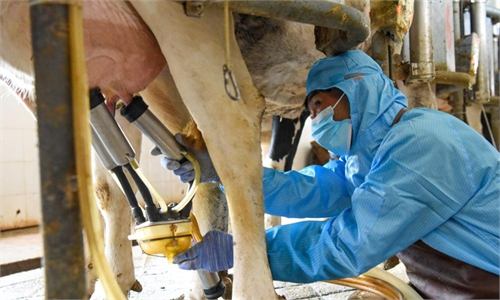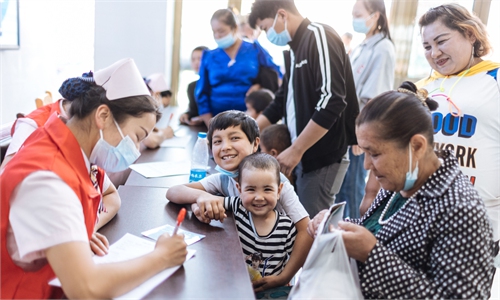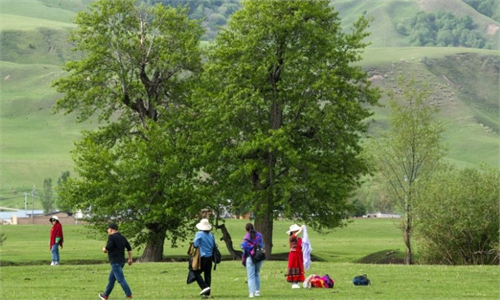SPORT / MISCELLANY
Fueled by popular passion and industry insiders’ unremitting efforts, Xinjiang becomes incubator for soccer
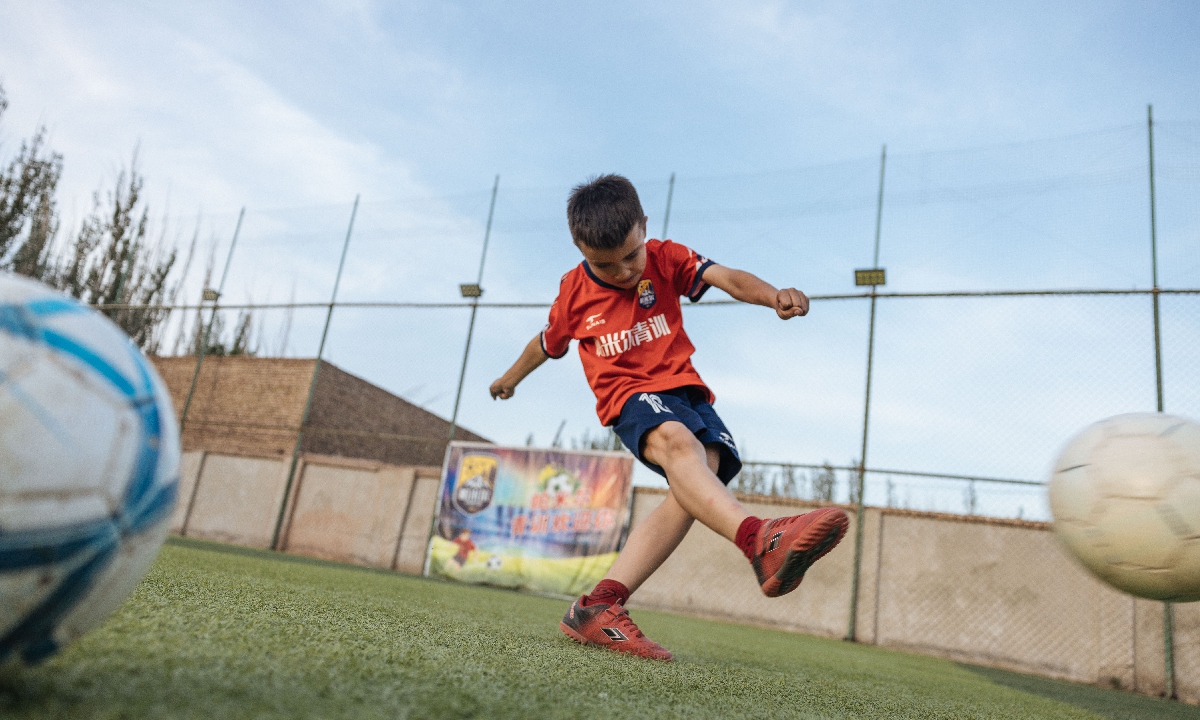
A young member of Kashi Prefecture's Pamir Soccer Club plays soccer on May 11, 2023. Photo: Li Hao/Global Times Art
There is a saying in Northwest China's Xinjiang Uygur Autonomous Region: "If you can talk, you can sing; if you can walk, you can dance; if you can run, you can play soccer."
The spirit of "good game" is palpable in the entire region.
Here, soccer is a popular sport for all, with a history that is well over a century old. "Playing soccer and getting into a professional team" is one of the ways many local children achieve success.
Currently, the inaugural "Xinjiang Happy Soccer Season" is in full swing in Kashi Prefecture. Over the next four months, this prefecture will host various themed tournaments such as the Xinjiang Soccer Championship and several street soccer matches. People will not only get to watch and join local teams, but the tournaments will also enhance cohesion among people from all ethnic groups.
Thanks to local dedication to the sport and the unremitting efforts of industry insiders at the grassroots level over the years, Xinjiang has gradually formed a soccer development path featuring greater participation from the masses and a sound system of advancement.
'Pure and instinctive love'
On an open piece of farmland, with a few bricks for goalposts, and a tattered soccer ball, Nurmemet Sherip, a boy from Xinjiang, practices his shooting, executing a flawless goal with each attempt. Videos of his training routine have garnered nearly 1.3 million followers on Chinese social media platforms.
Such scenarios are not uncommon in the region.
"Xinjiang people's love for soccer is pure, simple and instinctive. As long as there is a fairly large open space, children will run around with the ball to their hearts' content. Everyone knows the stories of the world's top soccer stars," Turahong Abudurhman, vice chairman of the Xinjiang Football Association, told the Global Times.
As early as 1885, soccer made a vivid impression in the Yikesake village on the Pamir Plateau, and became a culture unto itself. The village, with its proximity to Central Asian nations, served as a key town along the Silk Road. Local residents who engaged in trade also encouraged the village youth to study overseas, and those who returned after completing their studies brought back soccer culture, establishing the village as one of the birthplaces of modern soccer in China.
When the Global Times reporter visited Yikesake village, athletic 88-year-old Jurat confidently showed off his skills in front of his house.
In 1927, farmers from Yikesake village rode horses and donkeys to Kashi to participate in an amateur soccer match. Surprisingly, they defeated not only the Swedish team 7-1, but also the British, who were always proud of their soccer skills, with a score of 1-0.
Jurat's grandfather was on that team. The heroic deeds of his grandfather also led Jurat to become a soccer player when he grew up.
After retiring from his job as a physical education teacher, Jurat has continued to keep an eye on the village's young soccer talent as they train at a newly constructed soccer pitch, which is also meant to be the site of a new soccer club.
Jurat also spends time every weekend playing soccer with his young grandson, who is a goalkeeper for the Yikesake Primary School soccer team. Jurat hopes his grandson will become a professional athlete and the new pride of the family.
"The current environment for soccer development in Xinjiang, and even in our whole country, is completely different from that of our time; young people have better training conditions," Jurat told the Global Times.
"One hundred years ago, our team was able to beat the European teams. I believe that in the future, the road for Chinese children to play soccer will be brighter," he said.
On April 16, during the first round of the 2023 Chinese Super League, 16-year-old Shahzat Ghojaehmet from Yining county, scored a penalty kick, setting a record for the youngest goal scorer in the Chinese Super League.
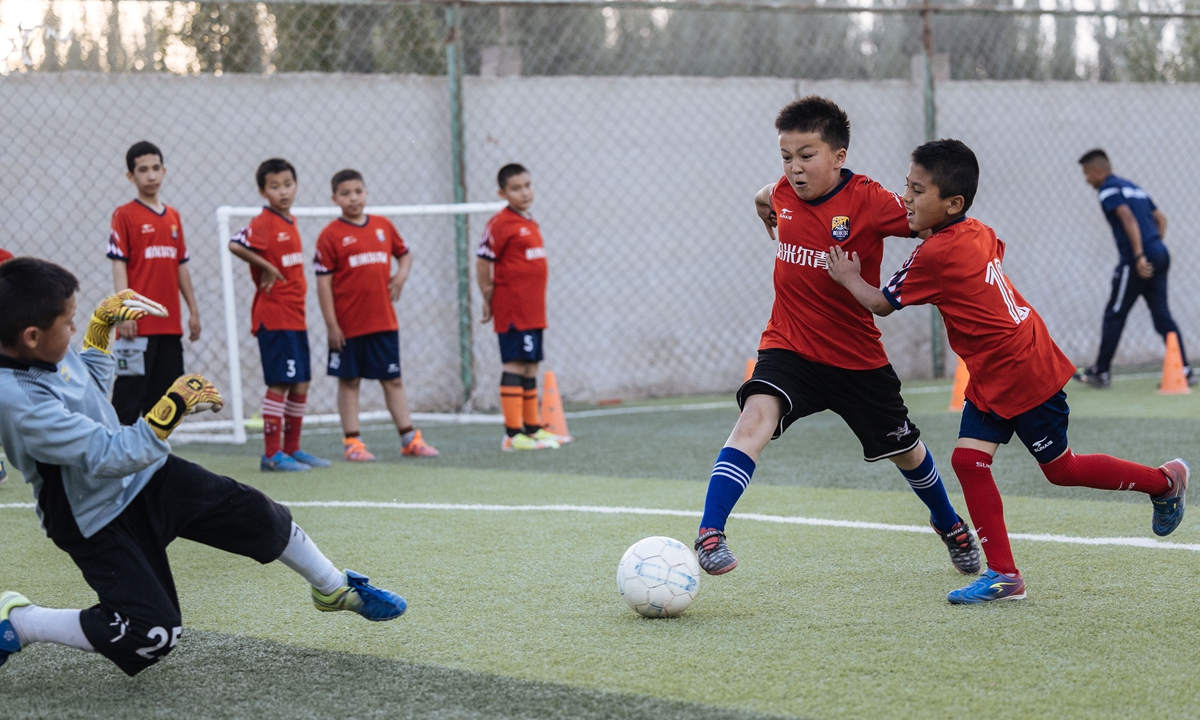
Young members of Kashi Prefecture's Pamir Soccer Club play soccer on May 11, 2023. Photo: Li Hao/Global Times Art
'Talent market'At present, there are about 200 soccer players from Kashi Prefecture alone who play for major Chinese mainland soccer clubs.
"Xinjiang is the 'talent market' of Chinese soccer," Turahong said.
Turahong noted that currently, constantly exploring new models of innovative campus soccer development, creating a stronger campus soccer culture, and making campus soccer a cradle for cultivating soccer talent have become the consensus of Xinjiang Football Association.
Every afternoon, the boys' and girls' teams of Shache County No.2 High School each occupy half of the soccer field for regular practice, with Varsjang Abudurhman, the varsity soccer coach, keeping a close eye on their movements.
As a soccer-oriented school, Shache County No.2 Middle School not only has a soccer team with numerous honors, but also sets up soccer interest classes after school.
"When we registered at the beginning of the semester, about 300 of the 1,000 students in the first grade wanted to choose soccer. We had to screen and sort them," said Varsjang.
Such "happy troubles" are very common in the Xinjiang region.
Unlike most Chinese professional soccer clubs, which have "difficulty in selecting talent," the situation faced by the founder of the Kashi Prefecture's Pamir Soccer Club, Tuluxun Maimaiti, is quite the opposite.
"There are too many gifted children enrolled," he said.
Tuluxun, 36, has been a key player for the Chinese national beach soccer team since 2008, but he told the Global Times that the time he spends practicing with children, planting new hope in his hometown, also gives him a sense of well-being.
The oldest participant in the club is 11 years old while the youngest is 5, and they train five times a week for nearly two hours per session.
Some children feel reluctant to come in the first one or two days of training, but after persisting for a week, they enthusiastically tell their parents that they want to be able to play soccer all the time, Tuluxun said.
Tuluxun pointed out that Xinjiang is now putting more efforts into promoting the development of soccer professionalism.
"In recent years, the training of soccer coaches in Xinjiang has become more frequent," Tuluxun said. "In schools, regular soccer cups are held two to three times per semester. In this way, a smoother bridge is built for the cultivation and transition of soccer talent."
Some parents prefer their children to spend more time on their studies, but seeing their children become happier and healthier, and getting awards in soccer training and competitions, they become more supportive of their children's choices, Tuluxun noted.
Tuluxun was proud to reveal that he has groomed more than 30 players for the Chinese Super League club's youth system, and he believes there will be more such talent in the future.
